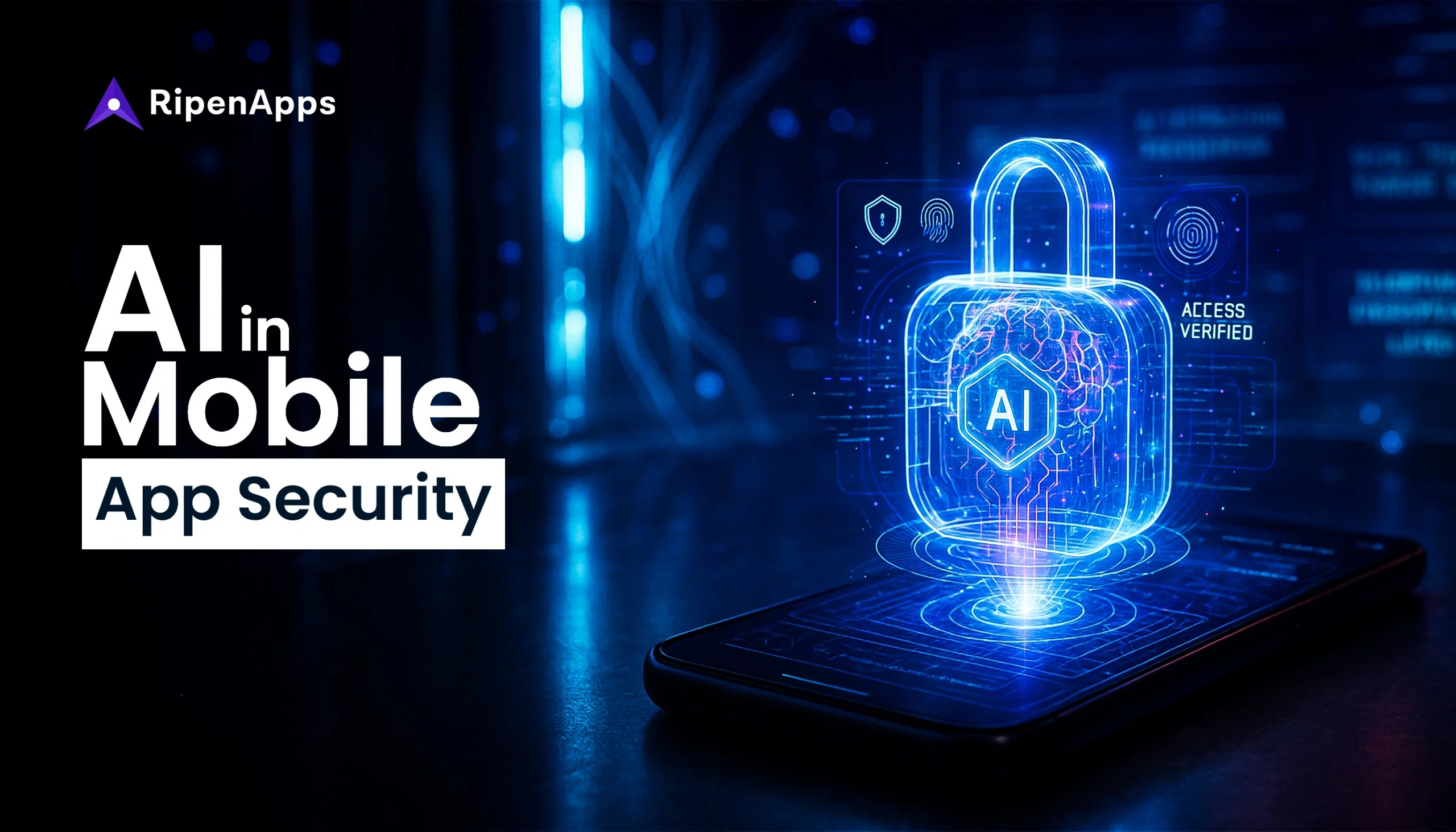Imagine you are using a mobile application to order food, pay bills, upload pictures, or chat with friends. While using the application, you add personal details like name, address, bank or payment information without a second thought, thinking that your data is safe. With mobile applications becoming a crucial part of our lives, keeping our data safe has become more important. That’s when you need AI in mobile app security, which acts as your security guard who is always watching over your data, securing you from threats, and preventing them before they do any harm.
As a business owner, using AI-powered mobile app security is a must because data protection has become the first priority of new-age mobile app users. And just like threats, your app’s security also needs to be smarter. Traditional security methods are no longer enough to detect advanced attacks or protect sensitive user data in real-time.
That’s why businesses need to take mobile app security seriously to retain more users, foster loyalty, and achieve sustainable growth. Focusing on an AI security solution is necessary for businesses to stay ahead of risks, build user trust, and safeguard their brand reputation.
If you are planning to strengthen your mobile app security or build a highly secure app, then you are at the right place because this article delves into how AI-powered security can help you with data protection to ensure that users’ information remains secure.
Table of Contents
The Role of AI in Mobile App Security

To understand why every business should prioritize mobile app security, it’s important to understand the role of artificial intelligence in advancing the security for applications. The role of AI in security can help you understand the benefits and necessity of using this advanced technology to make your app secure and reliable.
1. AI-Powered Threat Detection
Artificial Intelligence has the wonderful ability to detect threats more effectively than traditional methods. The users and traffic are increasing day by day, and it has become impossible for human teams to monitor every interaction and detect potential risks. AI application security can analyze large amounts of data in real-time and detect unusual patterns that indicate a cyber threat.
For example, AI is proficient in recognizing malware, phishing attacks, or suspicious login attempts. It also uses machine learning (ML) models to learn from previous data to improve its ability to detect new types of threats. Having the ability to respond quickly to emerging threats is a game-changing thing for businesses.
2. Behavioral Analysis For Fraud Detection
AI is useful for identifying unusual user behavior that might suggest fraudulent activity. AI can analyze how users interact with the app, and it can detect patterns that seem out of place. Suppose a user has started making large financial transactions, changing login locations, or attempting unauthorized access. AI can remind you to review these actions, ensuring cybersecurity for mobile apps across industries.
For example, a banking app may use artificial intelligence to monitor user behavior and identify any changes from the normal patterns. If a person tries to log in from an unfamiliar device or location, the AI system can trigger advanced security measures to confirm the account owner’s identity.
3. Preventing Identity Theft with Biometric Security
Many mobile applications use biometric authentication, like fingerprint recognition, facial scans, or vocal recognition, to provide secure access. AI makes these authentication methods more accurate and secure. That’s when you need to use AI in mobile app security to add another layer of security to your mobile app.
It improves biometric security by constantly learning and adapting to changes in a user’s physical characteristics. If a user changes their appearance, the AI-powered biometric system can still recognize them. This level of perfection reduces the chances of identity theft and allows authorized users to access sensitive information.
4. User Privacy and Data Protection
User privacy is a paramount concern in this mobile-first world. Instead of just collecting personal data, an AI security app for Android, iOS, or both helps protect user data by monitoring how it’s collected, stored, and used. Focusing on user data protection is one of the top Android application security best practices.
It ensures that applications comply with data protection regulations like GDPR, CCPA, etc. The use of AI in mobile app security can help identify when apps collect excessive data or store it improperly. It can anonymize a lot of data to make it harder for hackers to extract sensitive information.
5. Automated Response To Security Incidents
When you face a cyberattack or security breach, time is the most critical thing. The faster you respond, the less damage is likely to occur. Using AI in mobile app security can help automate the response process by identifying threats and taking immediate action. This is one of the top AI applications in cyber security.
For instance, when AI detects a malware infection, it can automatically isolate the affected part of the app, stopping the malware from spreading. It can also notify the security team and provide detailed reports on the nature of the attack.
What Makes AI Superior to Traditional Mobile App Security?
Now that you have understood the role of AI in mobile app security. It’s important to learn what makes artificial intelligence superior to traditional mobile app security. This difference is essential for understanding why you should choose AI instead of traditional methods.
1. Protection From New-Age Threats
Traditional security systems rely on predefined rules to spot threats. This means they can only detect what they have been programmed to recognize. But having an AI security app can help you detect unusual behavior in real-time, even if the threat is new or unknown. It learns from patterns and identifies anomalies that a static system might miss.
2. Self-Learning and Adaptive Defense
AI gets smarter over time. The more data it processes, the better it becomes at identifying risky behavior, fraudulent activity, or data breaches. Traditional tools require manual updates, but using AI in application helps them evolve constantly and adapts to new attack strategies without human intervention.
3. Response Faster Than Expected
Traditional systems can detect an issue, but it will be done after the damage is done. Instead of these systems, you can use an AI security app to react instantly to block suspicious activity before it affects the user. For example, when an AI model detects a login attempt from a suspicious location, it can prompt a re-authentication or freeze the session right away. This is one of the necessary things for increasing security, especially when you have decided to work on AI app ideas.
4. Prevents Fraud Activities
AI-powered fraud detection is famous among every industry because these models analyze millions of data points such as user behavior, transaction history, device info, and more. It helps in spotting even the slightest deviations. On the other hand, traditional systems might miss these subtle signs, but artificial intelligence security tools act on them proactively.
5. Personalized and Contextual Security
AI doesn’t treat every user the same. It has ability to create individual behavior profiles, which makes it easier to detect when something is “off.” This means the application becomes more secure without making the user experience harder. This is not possible in traditional methods. Having a personalized profile for each individual is what differentiates AI based security from traditional methods.
Artificial Intelligence transforms how mobile app security works. It’s faster, more adaptable, and far more effective than traditional methods. For businesses building modern mobile apps, integrating AI in mobile app security is a critical move.
Common Mobile App Security Challenges AI Can Solve
We live in a world where mobile applications handle every important thing, including personal data such as health and payment records. On the other hand, security risks are also growing rapidly. Not everything can be solved with traditional methods, and that’s when you need to use AI in mobile app security. Here are some common security challenges that artificial intelligence can solve:
1. AI Easily Catches Weird Logins
You know those weird logins that show up from another country or at a strange hour? Those aren’t always someone forgetting their password. Sometimes, it’s a bot trying to break in. AI secure systems are really good at spotting this kind of thing. They learn how real users behave, their typing speed, locations, even the device they usually use, and when something feels “off,” they flag it or block access immediately.
2. Malware Doesn’t Get Past AI Easily
Malware can be sneaky. It hides in plain sight and can even look like a harmless update. But here’s the thing, artificial intelligence security issues like this don’t go unnoticed by AI. It keeps an eye on what your app is doing in the background. If it sees an app asking for weird permissions or behaving in unexpected ways, it can raise a red flag, long before the user realizes something’s wrong. You don’t need to be tech-savvy. Just let the system work.
3. AI Provides Extra Protection When Apps Become Careless
Sometimes, apps save sensitive user data (like location, contacts, or payment info) without proper protection. And let’s be real, that’s not okay. But here’s where AI really shines. Instead of treating all users the same, AI secure platforms adjust how they handle data depending on the risk. For example, if someone is doing a transaction, AI makes sure the data gets encrypted instantly. It adds a safety net, without slowing things down. To avoid the carelessness of your app, you need to use AI in mobile app development. It can help you build an advanced application.
4. AI Doesn’t Get Tired
Every AI security software is proficient in working without any interruption. People get tired. They miss signs. They assume something’s safe when it’s not. But AI? It doesn’t need a coffee break. AI-based systems are always on. They’re constantly learning from what’s happening in real time. So if there’s a threat, like suspicious payment behavior or someone trying to bypass an app’s security, it jumps in right away. Whether you’re using a premium tool or even an AI security app free version, that peace of mind is a win.
Whether you’re building a fitness tracker, a finance app, or a real estate platform, giving your users AI secure protection means they can trust you, and that trust is what keeps them coming back. So yes, AI is doing all the hard work, your users will never have to worry about. You can partner with one of the top mobile app development companies in India to solve these challenges at a budget-friendly cost.
How Businesses Can Integrate AI in Mobile App Security?
You don’t need a big team or fancy tech to start using AI in mobile app security. These days, even small apps can use tools like a simple AI application or an AI security app lite to block shady logins or keep user data safe. You can start small, just look at where your app feels most exposed. Maybe it’s payments, maybe it’s users forgetting passwords, or maybe you just want to make sure your backend isn’t being messed with.
There are plenty of real examples of AI in security where businesses saw quick wins just by adding smart tools that run quietly in the background. And the best thing is, AI doesn’t get in your users’ way. It watches patterns, learns over time, and steps in only when something seems off. No extra logins or annoying alerts.
It helps with more than just front-end stuff, too; it can keep an eye on your data storage, APIs, and all the backend areas that users never see. If you’re not sure how to set it up, it’s totally okay to bring in someone who knows. You’re not trying to make your app complicated, just smarter and safer without losing what makes it work. You can partner with a company or hire a mobile app developer who is proficient in artificial intelligence.
Real-World Examples of Using AI in Mobile App Security
Some big brands/apps have already used artificial intelligence tools to secure their mobile applications’ security. This step has helped them foster trust, reach more users, and maximize revenue just by safeguarding their application.
1. PayPal – A Fintech Giant
If you’ve ever used PayPal, you’ve probably seen how smooth the experience is: log in, send money, done. But behind that simplicity, a whole lot is going on. PayPal uses AI in mobile app security to detect fraud patterns in real time. Let’s say someone tries to log in from two places at once, or a big transaction suddenly happens at 3 AM, AI doesn’t just panic.
It compares that action to your usual behavior, and if something seems off, it flags it or even stops it. This saves users from having to deal with fraud later, and the app doesn’t slow down by asking for a dozen passwords either. It’s just smart protection that works quietly.
Read Also: The Role of AI in Fintech: Building Financial Advisor Apps for Smarter Investing
2. Ada Health – Keeping Health Data Secure
Health apps deal with information that’s way more sensitive than most people realize symptoms, prescriptions, and test results. Ada Health, for example, uses AI-powered mobile security to make sure none of that data leaks or gets into the wrong hands.
It watches for unusual data requests in the background, like a plugin suddenly asking for access it shouldn’t have, and blocks it right there. That means users don’t have to worry about someone snooping into their health info. For an app that’s focused on personal well-being, this kind of built-in mobile app data protection is a game-changer and inspiring for other healthcare mobile apps.
Read Also: How AI in Healthcare Apps Can Help You Enhance Patient Care?
3. Amazon – Making Shopping Easy
With millions of users active every day, Amazon’s app is a goldmine for attackers, fake accounts, spam reviews, bot checkouts, you name it. But they’ve been ahead of the curve. Their systems use AI-based threat detection to spot patterns bots follow, like typing speed, click frequency, and even device behavior. If something feels robotic or unnatural, it either blocks it or makes the user verify it again. This helps cut down on fake traffic and ensures real users don’t have to compete with bots during, say, a flash sale.
Read Also: How To Boost Your Ecommerce Business With AI Powered Mobile Apps?
Conclusion
Building a mobile app without thinking about security is just asking for trouble. And with the way threats keep getting smarter, your security needs to be advanced. That’s why you need to use AI in mobile app security because it outperforms traditional methods, and it’s a must-have for businesses. However, using artificial intelligence in mobile apps isn’t an easy task and you need to partner with a reliable AI app development company to make all the difference. They can help you choose the right tools, integrate smart security, and build an app that’s future-ready.
FAQs
Q1. What is the use of AI in application security?
AI in mobile app security refers to the use of artificial intelligence technologies to improve the protection of digital systems and data from cyber threats. This emerging technology uses machine learning, neural networks, and other AI techniques to detect and prevent cyber attacks.
Q2. Is AI security only for big companies?
Not at all. These days, even startups and small businesses are using AI tools that are lightweight and easy to integrate. From building a fitness app or a fintech product, there are AI security apps and APIs for every industry without needing a huge budget or team.
Q3. Will AI increase app development or maintenance costs?
There’s an upfront investment for businesses for it’s far less than the cost of recovering from a breach. Also, AI tools reduce manual checks, automate detection, and improve compliance, which saves time and money in the long run.
Q4. How does AI improve security compared to traditional methods?
Traditional security tools are reactive, but AI is proactive. It monitors user behavior, detects unusual activity instantly, and reacts before damage is done. It’s smarter, faster, and scalable, which is the requirement for growing apps.












 India
India USA
USA Australia
Australia Canada
Canada UK
UK UAE
UAE
